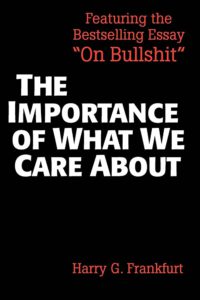 The debate on free will has traditionally focused on how external constraints may prevent us from freely doing what we want to do. In contrast, modern psychology highlights how internal constraints (or drives) such as addictions, phobias and other kinds of compulsive behavior can be even more compelling in determining our actions. Frankfurt introduces several distinctions to our internal constraints or desires in order to shed light on they affect the way we exercise our free will.
The debate on free will has traditionally focused on how external constraints may prevent us from freely doing what we want to do. In contrast, modern psychology highlights how internal constraints (or drives) such as addictions, phobias and other kinds of compulsive behavior can be even more compelling in determining our actions. Frankfurt introduces several distinctions to our internal constraints or desires in order to shed light on they affect the way we exercise our free will.
(1) First-order desire: “A wants X”, is a desire to perform some action. A desire to eat a mango is a first-order desire; a desire for world peace is not.
(2) Will: a first-order desire which is effective, i.e. which causes one to do what one desires to do. A desire to eat mango is one’s will in Frankfurt’s sense, if that desire brings one to actually eat mango. Continue reading “Reformed Compatibilist Freedom. Part 2. Harry Frankfurt on Hierarchy of Motives and Free Will”